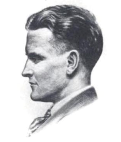The Great Gatsby by F. Scott Fitzgerald
Page 9 of 25 - 1 2 3 4 5 6 7 8 9 10 11 12 13 14 15 16 17 18 19 20 21 22 23 24 25 Purchase full notes for £6.95 (aprox $10.84)
EPIGRAPH
‘gold-hatted, high-bouncing lover’ – The book begins with this absurd image, which appears to parody Gatsby’s dreams of reunion with Daisy. The image suggests frequent, undignified returns to ground-level, and it is difficult to imagine that gaudy hat remaining in place for long with so much bouncing! ‘Thomas Parke D’Invilliers’ is not a real individual, but a character from Fitzgerald’s first novel, This Side of Paradise . It makes clever sense for a novel, ostensibly written by the fictional character Nick Carraway, to have an epigraph written by another fictional character.
CHAPTER ONE
7 ‘my younger and more vulnerable years’ – Nick’s first words to the reader imply that he is writing from a secure position of authorial objectivity and ‘distance’. He is now less vulnerable and at least a few years older than he was when the fictional events he describes were unfolding before him. In fact, his objective ‘distance’ from the situations he describes is much less clear cut than these lines would suggest, and the ‘older’ Nick is only an occasional presence in the novel.
7 ‘ “When you feel like criticising anyone…”’ – One of the novel’s major themes – the passing judgement on others – is immediately established.
7 ‘all the people in this world haven’t had the advantages that you’ve had’ – Nick’s father implies to the reader that his son is an advantaged narrator, and, therefore, someone who might be tempted to look down on other people and judge them. It is suggested that the lifestyle and values of the Middle-West provide the standard to which all others should aspire.
7 ‘unusually communicative in a reserved way’ – Like many phrases in the novel, this appears to be a contradiction in terms. Presumably it means that Nick and his father exchange few words, but that those words are more meaningful than might at first appear.
7 ‘I’m inclined to reserve all judgements’ – Nick vaunts himself to the reader as a cautious, thoughtful, and therefore, reliable narrator. It is somewhat unusual for first person narrators to establish their credentials quite so blatantly, and this statement, in itself, creates a degree of scepticism in the wary. In fact, the book is full of Nick’s judgements of others: several are given on the very next page.

